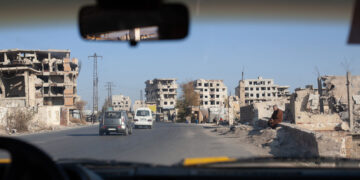Ossama Soffar is an Egyptian journalist living in Canada.
عربي
Once again, President Abdel Fattah al-Sisi's regime has used Egypt's entertainment industry to broadcast overt propaganda during Ramadan and distract from the country's bankrupt reality. The latest season of the TV drama "The Choice"—"Al-Ikhtiar" in Arabic—has been airing in Egypt this month, after two previous seasons that repeated the government's narratives about the Muslim Brotherhood and the massacre at Rabaa al-Adawiyah Square. Sisi's regime rolls out these government-approved TV dramas, which have been released by production companies co-opted by Egypt's intelligence services, whenever it needs a fictitious achievement to atone for the crisis Egypt is in—and whenever it wants to create more myths around Sisi and further destroy cultural life in Egypt, replacing it with conspiracies, hyper-nationalism and madness.
"The Choice 3" claims to go "behind the scenes of Egypt's most dangerous 96 hours"—the mass demonstrations of June 30, 2013 against President Mohammed Morsi, which led to Sisi's coup on July 3. The series portrays Sisi, then serving as Morsi's defense minister, as "saving" Egypt from "the Muslim Brotherhood's dark path," as one of its promotional trailers proclaims. The show's blatantly political production garnered widespread criticism online, for both its director, Peter Mimi, and the actors in its high-profile and expensive cast, specifically Yaser Galal, who plays the role of Sisi—the first time Sisi has been portrayed on TV. The show was reportedly produced by Synergy, a media company with close ties to Egypt's intelligence agency.
Sisi's regime rolls out government-approved TV dramas whenever it needs a fictitious achievement to atone for the crisis Egypt is in—and whenever it wants to create more myths around Sisi and further destroy the country's cultural life.
- Ossama Soffar
The authorities haven't tolerated any criticism of the show, even reportedly arresting a lawyer, Nabeel Abu Sheikha, for a satirical post on Facebook about Galal's role in "The Choice." He was charged with joining a terrorist group and spreading false news, in an apparent attempt by the Public Prosecution Office to scare other Egyptians from publicly mocking or criticizing the series. But instead of stoking fear, the authorities' reaction fed a social media campaign mocking the series even more. As it glorifies Sisi as the ultimate hero, brave and pious, "The Choice" gives him improbable physical attributes that many Egyptians have laughed at: Galal, who is famously tall, is playing an Egyptian president known for his shortness.
The series also shows Sisi, as defense minister, in a state of constant defiance of Morsi, the democratically elected president he would depose—in clear contrast to the public deference that Sisi, in reality, often showed Morsi at the time and that insiders say he maintained in their private meetings. This is no surprise, given the show's attempts to portray a treasonous Muslim Brotherhood that Sisi must "protect" Egypt from, with Morsi and other Brotherhood leaders like Mohamed Badie and Khairat el-Shater depicted as spies and traitors.
"The Choice" is airing more than a decade since Sisi's coup. In that time, the country has been plunged into debt—the highest ever in Egypt—and the middle class has collapsed. Like the first two seasons of "The Choice," this series devolves into another murky place between drama and documentary, often mixing in archival news footage and even leaked government videos about Brotherhood leaders, recorded by state agencies at the time—another sign of the apparent involvement of the intelligence services in its production. The fictionalized accounts of Sisi are interspliced with actual documentary footage, blurring the lines between reality and propaganda. The director, Peter Mimi, doesn't hide his pro-government agenda. As he said of the second season of "The Choice," which promoted the government's lies about the Rabaa massacre, "The series is a patriotic and national project to raise awareness for future generations."
Since the beginning of the Sisi era, the function of Egyptian TV dramas and soap operas has shifted, as they have become obvious mouthpieces for the government.
- Ossama Soffar
Since the beginning of the Sisi era, the function of Egyptian TV dramas and soap operas has shifted, as they have become obvious mouthpieces for the government. Led by "The Choice," they have focused on recent events in an attempt to rewrite that history, especially how Sisi came to power and what happened to the Muslim Brotherhood. The narrative of the victorious, of the new status quo established following Sisi's coup, has seemingly prevailed. But despite its huge budget to glorify one person in Sisi, many Egyptians who have seen "The Choice 3" must know that the series is a big and scandalous lie—because they lived through this history themselves and witnessed events like the June 30 protests as they happened on the ground.
Sisi rules Egypt today without any opposition, except for a few voices abroad. His potential opponents are dead or behind prison walls. Why, then, does his regime want to reopen the country's wounds through this TV show—demonizing the Brotherhood and all of its supporters, and dividing Egyptians into two rival camps, during Ramadan no less? Above all, the show is a distraction from all the suffering and problems that Egyptians face under Sisi's rule: staggering debt and high prices, and further repression and assaults on national dignity, symbolized by the deaths of those who dare to think, such as forcibly disappeared economist Ayman Hadhoud. Instead of addressing any of that, Sisi's government hopes Egyptians will watch a show that feeds the myth of a legendary hero who claims he saved Egypt.





































